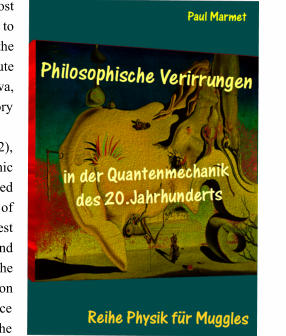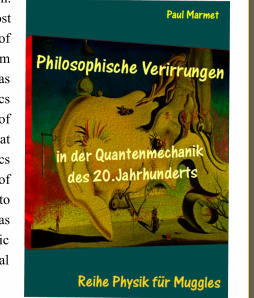








A Muggle’s Bibliothek
English original sources
last
revision:
12/18/2023
16/2021

A Muggle’s Bibliothek

© Dr. Ing. Dipl Phys. M. Hüfner 2014

Philosophische Verirrungen in der Quantenmechanik
des 20. Jahrhunderts
About the Author: Paul Marmet, Ph. D. (1932-2005) was one of the most important critics of the theory of relativity in modern times. From 1990 to 1999, Paul Marmet was assistant professor in the physics department of the University of Ottawa. He was a senior researcher at the Herzberg Institute of Astrophysics of the National Research Council of Canada, in Ottawa, from 1983 to 1990. From 1967 to 1982, he was director of the laboratory for Atomic and Molecular Physics at Laval University in Québec City. A past president of the Canadian Association of Physicists (1981-1982), he also served as a member of the executive committee of the Atomic Energy Control Board of Canada from 1979 to 1984. Marmet was elected Fellow of the Royal Society of Canada in 1973 and was made an Officer of the Order of Canada in 1981. The Order of Canada is the highest decoration bestowed by the Canadian government. Between 1978 and 1998, the author also published several other papers related to the fundamental principles in physics. Several of these papers are presented on this web site. In 1997-99, physicists of the establishment showed fierce disagreement with the fact that Marmet’s research implied that the fundamental principles of physics were being questioned. Although the experimental work, which could determine the energy of numerous quantum stated was highly appreciated and even honoured, the physics establishment required that the author should stop questioning the fundamental principles of physics. The author was first informed by NSERC (Natural Science and Engineering Research Council of Canada) to stop doing that fundamental research despite the fact that, being theoretical, it required no research funds - all research grants were used for the experimental work needed for the electron impact apparatus. Since the fundamental research was still going on the following year, the grant was cut to zero, putting an end to experimental work using the mono- energetic electron beams. In May 1999, the head of the physics department came to Marmet’s office and said: “We do not want your office, your problem is that you keep questioning the fundamental principles of physics.”) Three months later, a letter was sent requiring Marmet's office to become unoccupied before the end of the month. Without research grant and being expelled from his office, Dr. Marmet continued his research alone at home. This shows that physics is not only a science, it is also a doctrine. Therefore, there are heretics. This is no different than in times of Galileo!
winden konnte.



From the preface of the German translation:
Quantum mechanics and relativity theory are the two physical theories that have shaped the 20th century. The revolutionary new compared to classical physics was the fact that the observer was included in the theory. However, this resulted in some absurd interpretations that were not to teach a student, why one sometimes ultimately decided on. Only at the formulas he should follow. But this can not go well to the duration. So I had professionally turned my practical tasks without completely losing theoretical physics from the back of the head. After the end of my career, I wanted finally close my understanding gaps in this area. Looking for a clear introduction to quantum mechanics, I noticed a small Reklam booklet of Werner Heisenberg, titled "Quantum theory and philosophy". The booklet seemed right for my concern. Especially the chapter on the Copenhagen interpretation of quantum mechanics, his conversation with Einstein and his relationship to Kant's philosophy, found my undivided attention. "The transition from the possible to the factual could find place at the time of the act of observation", he stated in his Copenhagen interpretation. And Einstein countered: "But from the principled position it is quite wrong to try to build a theory only on observable quantities. For it is exactly the opposite. Only the theory decides what one can observe. " In the discussion of Werner Heisenberg and Carl Friedrich von Weizsäcker with the young philosopher Grete Hermann it came to the law of causality, that should no longer be valid in quantum mechanics ...

The physical world view between reality and surrealism









last revision: 01/16/2023

Muggle’s Library

© Dr. Ing. Dipl Phys. M. Hüfner 2014
winden konnte.
Philosophische Verirrungen in
der Quantenmechanik
des 20. Jahrhunderts
About the Author: Paul Marmet, Ph. D. (1932-2005) was one of the most important critics of the theory of relativity in modern times. From 1990 to 1999, Paul Marmet was assistant professor in the physics department of the University of Ottawa. He was a senior researcher at the Herzberg Institute of Astrophysics of the National Research Council of Canada, in Ottawa, from 1983 to 1990. From 1967 to 1982, he was director of the laboratory for Atomic and Molecular Physics at Laval University in Québec City. A past president of the Canadian Association of Physicists (1981-1982), he also served as a member of the executive committee of the Atomic Energy Control Board of Canada from 1979 to 1984. Marmet was elected Fellow of the Royal Society of Canada in 1973 and was made an Officer of the Order of Canada in 1981. The Order of Canada is the highest decoration bestowed by the Canadian government. Between 1978 and 1998, the author also published several other papers related to the fundamental principles in physics. Several of these papers are presented on this web site. In 1997-99, physicists of the establishment showed fierce disagreement with the fact that Marmet’s research implied that the fundamental principles of physics were being questioned. Although the experimental work, which could determine the energy of numerous quantum stated was highly appreciated and even honoured, the physics establishment required that the author should stop questioning the fundamental principles of physics. The author was first informed by NSERC (Natural Science and Engineering Research Council of Canada) to stop doing that fundamental research despite the fact that, being theoretical, it required no research funds - all research grants were used for the experimental work needed for the electron impact apparatus. Since the fundamental research was still going on the following year, the grant was cut to zero, putting an end to experimental work using the mono-energetic electron beams. In May 1999, the head of the physics department came to Marmet’s office and said: “We do not want your office, your problem is that you keep questioning the fundamental principles of physics.”) Three months later, a letter was sent requiring Marmet's office to become unoccupied before the end of the month. Without research grant and being expelled from his office, Dr. Marmet continued his research alone at home. This shows that physics is not only a science, it is also a doctrine. Therefore, there are heretics. This is no different than in times of Galileo!


From the preface of the German translation:
Quantum mechanics and relativity theory are the two physical theories that have shaped the 20th century. The revolutionary new compared to classical physics was the fact that the observer was included in the theory. However, this resulted in some absurd interpretations that were not to teach a student, why one sometimes ultimately decided on. Only at the formulas he should follow. But this can not go well to the duration. So I had professionally turned my practical tasks without completely losing theoretical physics from the back of the head. After the end of my career, I wanted finally close my understanding gaps in this area. Looking for a clear introduction to quantum mechanics, I noticed a small Reklam booklet of Werner Heisenberg, titled "Quantum theory and philosophy". The booklet seemed right for my concern. Especially the chapter on the Copenhagen interpretation of quantum mechanics, his conversation with Einstein and his relationship to Kant's philosophy, found my undivided attention. "The transition from the possible to the factual could find place at the time of the act of observation", he stated in his Copenhagen interpretation. And Einstein countered: "But from the principled position it is quite wrong to try to build a theory only on observable quantities. For it is exactly the opposite. Only the theory decides what one can observe. " In the discussion of Werner Heisenberg and Carl Friedrich von Weizsäcker with the young philosopher Grete Hermann it came to the law of causality, that should no longer be valid in quantum mechanics ...






























